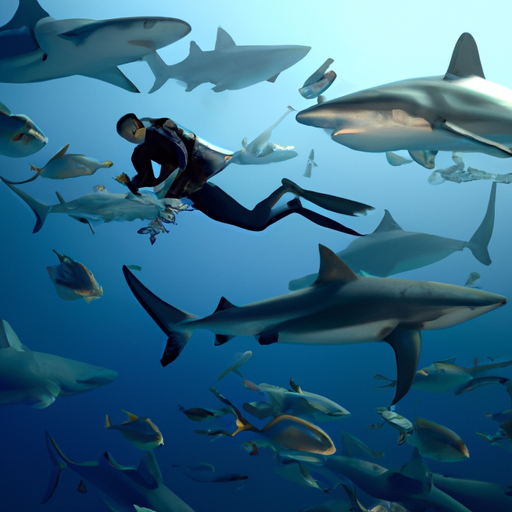So, picture this: you’re out on a dive, exploring the depths of the ocean, when you come across a majestic shark gliding through the water. But the question that lingers in your mind is, does this sleek predator actually recognize you as a diver? Well, it’s a fascinating topic that has intrigued scientists and divers alike. In this article, we’ll explore the intriguing question of whether or not sharks have the ability to recognize divers, and what the latest research has to say about this mysterious underwater phenomenon. Get ready to dive into the depths of the shark’s intriguing world!

How do sharks perceive divers?
When it comes to understanding how sharks perceive divers, several factors come into play, including their visual perception, acoustic perception, and electroreception. Sharks rely on these sensory systems to gather information about the world around them, including the presence of divers.
Visual perception
One aspect of shark perception involves their visual acuity and the cues they use to recognize divers. Sharks have excellent eyesight, with some species having the ability to see colors, while others primarily detect contrast and movement.
Acoustic perception
Another sensory modality that sharks rely on is their acoustic perception. Sharks have a remarkable ability to detect and interpret sound waves in water. It is believed that they can recognize and distinguish certain sounds associated with divers, such as the bubbles generated by scuba equipment or the sound of underwater cameras.
Electroreception
Sharks possess a unique sensory system known as electroreception. This sense allows them to detect electric fields produced by living organisms, such as the weak electrical signals generated by the muscles and nervous systems of divers. Electroreception plays a crucial role in the shark’s ability to locate and sense potential prey or nearby objects.
Visual cues sharks use to recognize divers
Sharks rely on various visual cues to recognize divers in their environment. These cues include color and shape recognition, size and motion recognition, and distinguishing equipment.
Color and shape recognition
Sharks have the ability to discern different colors and shapes, which can aid them in identifying divers. Brightly colored swimwear or equipment can attract their attention, and certain shapes may stand out in their field of vision. Some species are known to be more attracted to contrasting colors, while others may be more responsive to specific shades or patterns.
Size and motion recognition
Sharks can also recognize divers based on their size and movement patterns. Larger divers may appear more conspicuous in the water and may elicit different responses from sharks compared to smaller individuals. Additionally, the way divers move underwater, whether it be swimming or diving, can also be a factor in how sharks perceive and interpret their presence.
Distinguishing equipment
Sharks may use the presence of specific equipment to recognize divers. For example, the silhouette of scuba gear or the noise generated by underwater cameras can create distinctive associations in a shark’s mind. These cues can help them identify divers and potentially influence their behavior towards them.
Factors influencing shark recognition
Several factors can influence how sharks recognize divers, including species-specific recognition, familiarity with divers, and environmental conditions.
Species-specific recognition
Different shark species may display varying degrees of recognition towards divers. Some species may be more accustomed to the presence of humans and therefore show less aggressive behavior, while others might perceive divers as potential threats and exhibit defensive responses.
Familiarity with divers
Sharks that have had repeated interactions with divers over time may become more familiar with their presence. This familiarity can lead to changes in their behavior, such as decreased aggression or increased curiosity, as they become accustomed to the divers’ presence.
Environmental conditions
Environmental factors, such as water clarity and visibility, can influence shark recognition of divers. In clearer waters, sharks may have a better visual perception of divers, allowing for easier recognition. Conversely, in murkier or turbulent conditions, sharks may rely more heavily on acoustic or electroreceptive cues to identify divers.
Shark behavior towards recognized divers
Once sharks have recognized and identified divers, their behavior can vary greatly. They may display curiosity and investigation, exhibit a neutral or indifferent response, or even demonstrate aggressive behavior.
Curiosity and investigation
When sharks are curious about divers, they may approach them to investigate further. This behavior can be seen as a natural response to their innate curiosity, as they seek to understand the unfamiliar presence in their environment. However, it’s important for divers to remember that even during a curious interaction, sharks are still powerful and potentially dangerous creatures.
Neutral or indifferent response
In some instances, sharks may not show a significant behavioral response towards recognized divers. They may continue with their natural activities without displaying any particular interest or concern. This neutral or indifferent behavior can occur when sharks have become familiar with divers and no longer perceive them as a threat or potential prey.
Aggressive behavior
While many sharks are docile and pose little threat to divers, there are instances where sharks may exhibit aggressive behavior towards recognized divers. This can occur due to various factors, including territorial defense, hunger or predation, or perceived threat or provocation. It’s essential for divers to be aware of the signs of aggression and know how to respond safely in such situations.

Instances of sharks displaying recognition towards divers
There have been numerous accounts of sharks displaying recognition towards divers, including recurring interactions with certain individuals, responses to specific behaviors, and documented case studies.
Recurring interactions with certain individuals
In some cases, individual sharks have been observed to repeatedly interact with specific divers. These recurring encounters suggest that sharks may recognize and remember certain individuals over extended periods of time. Such instances can provide valuable insights into the social behavior and relationships between sharks and divers.
Responses to specific behaviors
Sharks have been known to respond differently to various diver behaviors, indicating a level of recognition. For example, sharks may approach divers who remain calm and still, while they may be more cautious or avoidant of divers who display erratic or aggressive movements.
Case studies of diver recognition
Researchers and dive operators have documented specific cases where sharks have exhibited recognition towards divers. These studies often involve photo-identification techniques to track individual sharks over time and record their interactions with divers. These case studies contribute to our understanding of shark behavior, perception, and the potential for long-term recognition.
Scientific studies on shark perception of divers
Scientific research has been conducted to further investigate how sharks perceive and recognize divers. These studies often involve observational research, behavioral experiments, and technological advancements.
Observational studies
Observational studies involve researchers observing and recording the behavior of sharks towards divers in their natural habitats. Through these studies, scientists can gather data on how sharks respond to different diver cues and interactions. This research helps to build a more comprehensive understanding of the factors influencing shark recognition.
Behavioral experiments
Behavioral experiments provide controlled environments where specific aspects of shark perception can be tested. For instance, researchers might utilize simulated diver movements or sound recordings to assess how sharks react to particular stimuli. These experiments allow for a more controlled examination of shark behavior and perception.
Technological advancements
Advancements in technology have enabled researchers to explore shark perception in new ways. For example, underwater cameras and tagging devices can capture detailed footage and data on shark behavior, providing insights into their interaction with divers. These technological advancements contribute to a more comprehensive understanding of shark perception and recognition.

Safety guidelines for diving with sharks
Diving with sharks can be an exhilarating experience, but it’s important to prioritize safety. Maintaining a safe distance, understanding behavior cues, and avoiding provocation are essential guidelines to follow when diving with sharks.
Maintaining a safe distance
Maintaining a safe distance from sharks is crucial to minimize the risk of negative interactions. It is recommended to stay at least several meters away from sharks and avoid approaching them too closely. This distance allows sharks to maintain their natural behaviors without feeling threatened.
Understanding behavior cues
Developing an understanding of shark behavior cues can help divers interpret how sharks perceive them. Evasive actions, such as sudden changes in direction or fast swimming, can be interpreted as threatening by sharks. It is important to remain calm, avoid direct eye contact, and maintain a relaxed and neutral body posture when encountering sharks.
Avoiding provocation
Divers should avoid provoking or intentionally engaging with sharks. This includes actions such as touching, riding, or feeding sharks, as these behaviors can disrupt their natural behavior and potentially lead to aggressive responses. Respecting sharks as wild animals and their natural environments is paramount for both diver safety and shark conservation.
Impact of diver recognition on shark conservation
Understanding how sharks recognize divers can have a positive impact on shark conservation efforts. By promoting conservation efforts, enhancing public perception of sharks, and mitigating negative human-shark interactions, diver recognition can contribute to the long-term conservation of these majestic creatures.
Promoting conservation efforts
When divers recognize sharks as important and valuable members of marine ecosystems, they are more likely to advocate for their protection. Through awareness campaigns, educational programs, and responsible diving practices, divers can become ambassadors for shark conservation and actively contribute to preserving their habitats.
Enhancing public perception of sharks
The recognition and understanding of shark perception towards divers can help dispel negative stereotypes and fears surrounding these apex predators. By sharing knowledge and experiences, divers can help change public perception and foster a greater appreciation for sharks, leading to increased support for conservation initiatives.
Mitigating negative human-shark interactions
By recognizing how sharks perceive and respond to divers, responsible diving practices can be developed to reduce the likelihood of negative interactions. This includes implementing guidelines for dive operators, educating divers on best practices, and adopting strategies that prioritize both diver safety and shark well-being.

Diver experiences and anecdotes
Divers often have personal encounters and anecdotes related to their experiences with recognized sharks. These encounters highlight the importance of respectful interactions and provide valuable insights into the dynamics between divers and sharks.
Personal encounters with recognized sharks
Many divers have shared stories of encountering sharks multiple times and observing consistent behavior between these encounters. These personal experiences contribute to the growing body of anecdotal evidence on shark recognition and reinforce the idea that sharks can indeed discern individual divers.
Importance of respectful interactions
Diver experiences underscore the significance of respectful interactions with sharks. Treating sharks with respect and maintaining an understanding that they are wild animals in their natural habitats can lead to more positive and safe experiences. Respectful interactions also help foster a greater appreciation for sharks and their conservation needs.
Community discussions and forums
Online communities and forums provide platforms for divers to share their experiences, discuss shark encounters, and exchange knowledge and insights. These discussions contribute to a collective understanding of shark recognition and promote responsible and informed diving practices.
Future research and understanding
While significant progress has been made in understanding how sharks perceive divers, there is still much more to learn. Future research should focus on exploring different shark senses, long-term tracking of identified sharks, and evaluating cognitive abilities in sharks.
Exploring different shark senses
Further research is needed to expand our understanding of how sharks utilize their different senses, such as smell and magnetoreception, to recognize and interact with divers. Understanding the full extent of their sensory abilities can provide a more holistic view of shark perception.
Long-term tracking of identified sharks
Continued long-term tracking of identified sharks can provide valuable data on their behavior patterns and recognition abilities over extended periods. This research can offer insights into the extent of shark memory and recognition of divers, and how these factors may influence their behavior and interactions.
Evaluating cognitive abilities in sharks
Understanding the cognitive abilities of sharks can shed light on their perception and recognition of divers. Cognitive experiments, such as problem-solving tasks or associative learning tests, can help determine the extent of sharks’ cognitive abilities and their capacity for recognizing and remembering divers.
In conclusion, understanding how sharks recognize divers is a complex and fascinating area of research. Through their visual perception, acoustic perception, and electroreception, sharks gather information about the presence and behavior of divers. Factors such as color and shape recognition, familiarity with divers, and environmental conditions can influence their recognition abilities. Additionally, diver recognition by sharks can result in various behaviors, from curiosity and investigation to neutral or aggressive responses. By adhering to safety guidelines, promoting shark conservation efforts, and sharing diver experiences and anecdotes, we can ensure respectful interactions with sharks and contribute to their long-term conservation. Continued research and understanding are essential for advancing our knowledge of shark perception and recognition, as well as for developing effective conservation strategies for these magnificent creatures.

- Can You Dive With Sharks In California? - August 19, 2024
- What Are The Rules Of Shark Cage Diving? - August 19, 2024
- Where In Florida Can You Dive With Sharks? - August 19, 2024








